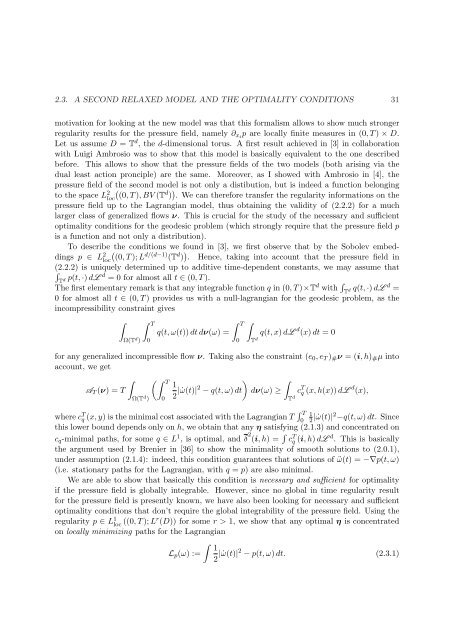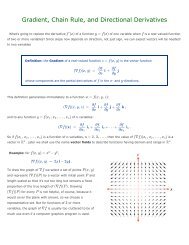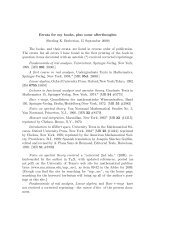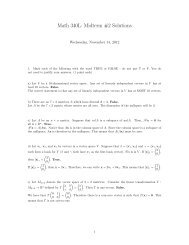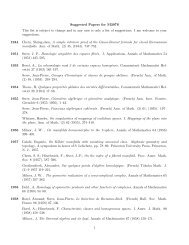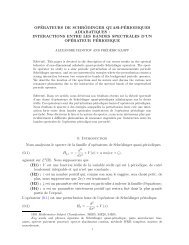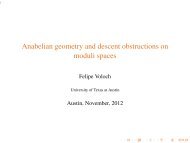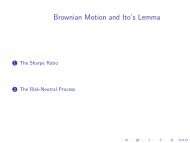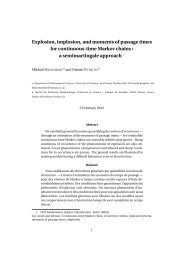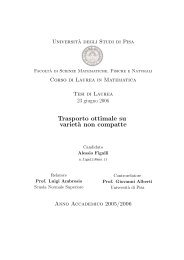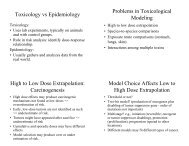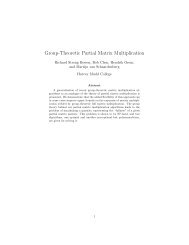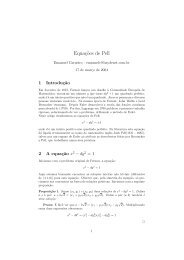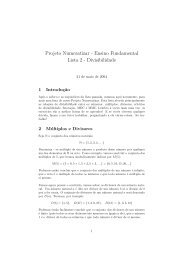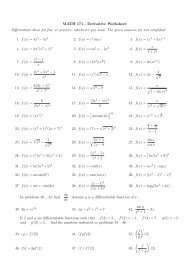Optimal transport, Euler equations, Mather and DiPerna-Lions theories
Optimal transport, Euler equations, Mather and DiPerna-Lions theories
Optimal transport, Euler equations, Mather and DiPerna-Lions theories
Create successful ePaper yourself
Turn your PDF publications into a flip-book with our unique Google optimized e-Paper software.
2.3. A SECOND RELAXED MODEL AND THE OPTIMALITY CONDITIONS 31<br />
motivation for looking at the new model was that this formalism allows to show much stronger<br />
regularity results for the pressure field, namely ∂xip are locally finite measures in (0, T ) × D.<br />
Let us assume D = Td , the d-dimensional torus. A first result achieved in [3] in collaboration<br />
with Luigi Ambrosio was to show that this model is basically equivalent to the one described<br />
before. This allows to show that the pressure fields of the two models (both arising via the<br />
dual least action pronciple) are the same. Moreover, as I showed with Ambrosio in [4], the<br />
pressure field of the second model is not only a distibution, but is indeed a function belonging<br />
to the space L2 <br />
loc (0, T ), BV (Td ) . We can therefore transfer the regularity informations on the<br />
pressure field up to the Lagrangian model, thus obtaining the validity of (2.2.2) for a much<br />
larger class of generalized flows ν. This is crucial for the study of the necessary <strong>and</strong> sufficient<br />
optimality conditions for the geodesic problem (which strongly require that the pressure field p<br />
is a function <strong>and</strong> not only a distribution).<br />
To describe the conditions we found in [3], we first observe that by the Sobolev embeddings<br />
p ∈ L2 <br />
loc (0, T ); Ld/(d−1) (Td ) . Hence, taking into account that the pressure field in<br />
(2.2.2)<br />
<br />
is uniquely determined up to additive time-dependent constants, we may assume that<br />
Td p(t, ·) dL d = 0 for almost all t ∈ (0, T ).<br />
The first elementary remark is that any integrable function q in (0, T )×Td with <br />
Td q(t, ·) dL d =<br />
0 for almost all t ∈ (0, T ) provides us with a null-lagrangian for the geodesic problem, as the<br />
incompressibility constraint gives<br />
<br />
Ω(T d )<br />
T<br />
0<br />
q(t, ω(t)) dt dν(ω) =<br />
T<br />
0<br />
<br />
T d<br />
q(t, x) dL d (x) dt = 0<br />
for any generalized incompressible flow ν. Taking also the constraint (e0, eT )#ν = (i, h)#µ into<br />
account, we get<br />
T 1<br />
AT (ν) = T<br />
2 | ˙ω(t)|2 <br />
− q(t, ω) dt dν(ω) ≥<br />
Td c T q (x, h(x)) dL d (x),<br />
Ω(T d )<br />
0<br />
where c T q (x, y) is the minimal cost associated with the Lagrangian T T<br />
0<br />
1<br />
2 | ˙ω(t)|2 −q(t, ω) dt. Since<br />
this lower bound depends only on h, we obtain that any η satisfying (2.1.3) <strong>and</strong> concentrated on<br />
cq-minimal paths, for some q ∈ L 1 , is optimal, <strong>and</strong> δ 2 (i, h) = c T q (i, h) dL d . This is basically<br />
the argument used by Brenier in [36] to show the minimality of smooth solutions to (2.0.1),<br />
under assumption (2.1.4): indeed, this condition guarantees that solutions of ¨ω(t) = −∇p(t, ω)<br />
(i.e. stationary paths for the Lagrangian, with q = p) are also minimal.<br />
We are able to show that basically this condition is necessary <strong>and</strong> sufficient for optimality<br />
if the pressure field is globally integrable. However, since no global in time regularity result<br />
for the pressure field is presently known, we have also been looking for necessary <strong>and</strong> sufficient<br />
optimality conditions that don’t require the global integrability of the pressure field. Using the<br />
regularity p ∈ L 1 loc ((0, T ); Lr (D)) for some r > 1, we show that any optimal η is concentrated<br />
on locally minimizing paths for the Lagrangian<br />
Lp(ω) :=<br />
1<br />
2 | ˙ω(t)|2 − p(t, ω) dt. (2.3.1)


